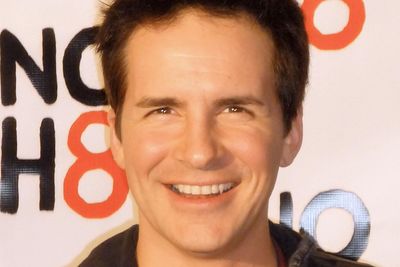Comedian Hal Sparks played Zanies on September 21. I sat down with him in the green room of the Nashville comedy club to chat about gay rights, his television roles, and the role of comedy in society.
Hal Sparks is part underdog, part top dog. The triple-threat actor/comedian/musician currently stars in Disney’s popular Lab Rats sitcom as successful billionaire genius Donald Davenport, a character Sparks describes as “completely full of himself.” During this fourth and final season of Lab Rats, Sparks will not only star in the show, he will also direct at least four episodes. But success was not always a given for Sparks, who grew up as a poor kid in Kentucky.
“In high school, I was a ‘zero,’ and in many ways I won,” he recalls. “I was not expected to succeed in any of the stuff that I have sought to be.” Sparks paid homage to his unexpected journey by naming his hard rock band “Zero 1,” a subtle nod to 2001: A Space Odyssey.
His underdog past may have helped him connect to his arguably most groundbreaking TV role, Queer as Folk’s Michael Novotny, a character with whom Sparks shares very little. “I have nearly nothing in common with Michael…I’m much more bullish in my life. I’m much more in control,” the actor explains. “The one thing [that I shared with Michael] is that I’ve always been panicked by the beauty of life. There are moments where it just floods, where you’re just like, ‘Oh, my God, this is all so beautiful, it’s silly.’ And Michael [had] that. He had that ‘I love you’ that came from somewhere rooted and deep and natural. And that’s what I liked, I think, most about him.”
Sparks isn’t shy about how heartbreakingly difficult it was to play Michael from 2000 to 2005, the five seasons Queer ran. “He was such an innocent, and he was so broadsided by life,” Sparks remembers. “It was an amazing acting experience to play Michael but it was like walking into a gut punch every time…There’s no other way to do it with Michael. You’re never guarded. So, it’s just always an open wound.”
Although Sparks describes the opportunity as utterly meaningful, it’s hard for him to miss the role. “Part of me can’t because it was brutal from that aspect. Everybody thinks it’s because playing gay and sex scenes and all that stuff. ‘That must have been the hard work of it.’ It was by no means,” he adds. “But being in a relationship drama [portraying] a character who was loving and innocent to his core in a lot of ways was just a recipe for emotional disaster.”
Though Sparks himself is straight, he has been an advocate for gay rights since the early 90s—years before Queer came along. “I used to do the sound at [spiritual author and lecturer Marianne Williamson’s] lectures in L.A. Marianne[’s meeting] was one of the few spiritual gatherings in L.A. where gay people could come and feel accepted,” he notes. “At that point, with her, and with people at her lectures, I was volunteering for AIDS Project Los Angeles.”
In addition to his work with Williamson, a personal connection groomed him to be an ally. “I used to have four running buddies when I was growing up in Kentucky. Two of them have come out as gay. Fifty percent of my best friends when I was a kid were gay.” No “aha” moment was necessary for Sparks to support equality. “I didn’t have [an] end-of-[an]-after-school moment where I was like ‘I need to learn to accept gay people’…The realization was that I never minded, really, and I couldn’t really wrap my head around the lack of acceptance. That part didn’t compute…It was that anybody gave a shit was peculiar to me.”
According to Sparks, a comedian’s role is to explore society’s viewpoints and examine fresh perspectives. “We all live in this highly complex social order and the more complex it gets, the more we run into what I would call like ‘psychological cul-de-sacs’ where everybody seems to be walking down a dead-end road and going in a circle doing something stupid or repetitive or pointless that we keep doing,” he explains. “Everybody’s doing the same shit and it’s not helping anybody and it’s not making us feel any better. So a comedian comes out, makes a big joke about it, and is essentially like a traffic cop going, ‘Everybody turn around. We’ll go back the other way. Nobody walk down this road anymore. It’s a dead end.’”
Sparks considers homophobia to be one of the “dead-end” destinations in this culture. “I always laugh at the idea of a gay agenda. The person drowning does not have an agenda. They just want to breathe. The person holding a person underwater is the one with the agenda. There’s a homophobic agenda. There’s not a gay agenda…Only straight people who don’t think gay people should have rights have an agenda about how to do it and they file legislation and do legal briefs and they do all kinds of stuff,” he continues. “So I’ve been very open about being straight because—it’s not because I’m trying to distance myself from my gay friends, my LGBT friends—it’s because I want the straight friends who don’t like that idea to know very strongly that I’m straight and I support everything about gay rights and fuck you.”
With a busy schedule that juggles his stand-up act, TV work, and playing and recording with his band, Sparks is committed to his craft. “That’s the whole job of being a singer, an artist, a poet, a painter: [to] convey understanding of a different point of view or give elevation to a hidden point of view or perspective that people are hiding from.”
